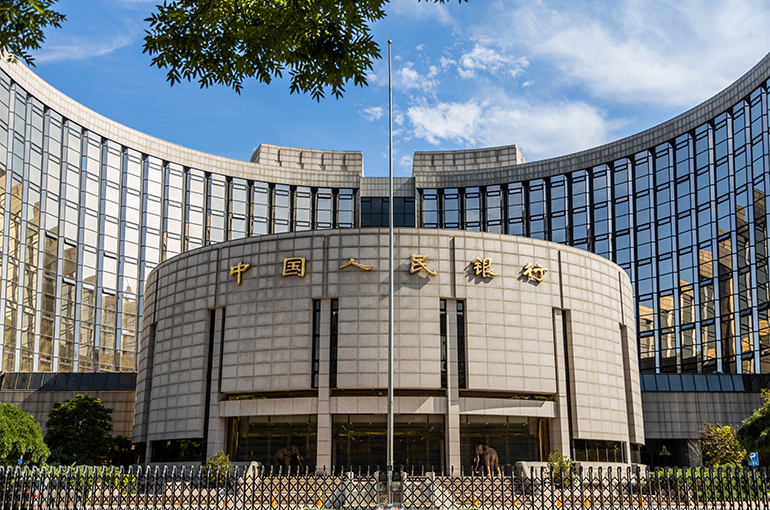 China’s Central Bank to Fine-Tune Monetary Policy as Needed, Deputy Governor Says
China’s Central Bank to Fine-Tune Monetary Policy as Needed, Deputy Governor Says(Yicai) Jan. 15 -- The People's Bank of China will implement a moderately loose monetary policy this year, adjusting and optimizing the pace and intensity as necessary, according to the central bank's deputy governor.
The PBOC will further strengthen countercyclical adjustments through macroeconomic policies and modify its approach based on domestic and international economic and financial conditions as well as the state of the financial markets, Xuan Changneng said at a press conference yesterday.
The bank will employ various monetary policy tools, including interest rates and the reserve requirement ratio, to maintain ample liquidity and ensure favorable social financing conditions, Xuan added.
Last year's monetary policy yielded positive results, with funding to businesses and households growing at a reasonable clip. According to data released by the PBOC yesterday, the outstanding balance of social financing stood at CNY408.34 trillion (USD55.7 trillion) at the end of December, up 8 percent from a year earlier. The balance of yuan-denominated loans rose 7 percent to CNY252.53 trillion.
In response to a question from Yicai, Xuan said that to achieve the goal of lowering overall borrowing costs, the PBOC will take comprehensive steps to expand the scope for interest rate policy.
He emphasized that the central bank will continue to crack down on banks illegally soliciting deposits at excessively high-interest rates, further reduce banks' borrowing costs, and alleviate pressure on their net interest margins. Additionally, it will step up efforts to replenish bank capital, Xuan said.
Yuan Stability
The PBOC will closely monitor the Chinese yuan's exchange rate, which remains stable due to strong foundations, Xuan said. The bank will take a range of measures to prevent excessive fluctuations in the yuan, maintain the exchange rate at a reasonable and balanced level, and lay a solid foundation for regulation based on domestic economic and financial conditions, he said.
As China's treasury bond yields have declined and the interest rate gap between China and the United States has widened, the depreciation pressure on the redback has grown.
Xuan said the goal of maintaining basic stability in the yuan remains unchanged. Comprehensive steps will be taken to strengthen the resilience of the foreign exchange market and stabilize market expectations, he said, emphasizing that China's strong economic foundations, ample forex reserves, and a resilient forex market provide certainty and robust support for maintaining the yuan’s stability.
Regarding internationalization of the yuan, Xuan said the PBOC will continue to follow market-driven principles that promote mutual benefit, balancing development and security to create a sounder environment for domestic and foreign entities to hold and use the currency.
He pointed out the need to improve the cross-border yuan use policy, enhance the ease of trans-border yuan transactions, support investment and liquidity management in yuan, expand risk-hedging tools, and help Shanghai to develop as a yuan-based financial asset allocation and risk management center.
The PBOC will also facilitate cross-border yuan financing activities, such as trade financing, overseas loans, and yuan bond issuance, he said.
In addition, the central bank aims to improve the offshore yuan liquidity supply mechanism, support the healthy development of the offshore yuan market, and consolidate Hong Kong's position as an international financial center and offshore yuan hub, Xuan noted.
Infrastructure for cross-border yuan use will also be optimized, and new yuan clearing banks will be established as needed, he added.
Treasury Buying Break
The PBOC's recent decision to temporarily halt the purchase of treasury bonds in the open market is intended to avoid disrupting investor allocation needs, exacerbating supply-demand imbalances, and causing market volatility, Zou Lan, director of the PBOC’s monetary policy department, said at the same press briefing.
The objective is to promote long-term market stability amid limited bond issuance, he said. Zou noted that China's bond market is still relatively young, and not all investors fully understand the price risks associated with government bonds.
"Long-term government bonds carry fixed coupon rates, so changes in market interest rate expectations can cause fluctuations in secondary market trading prices, sometimes significantly,” he said. “So investing in government bonds isn’t risk-free.”
Editor: Emmi Laine